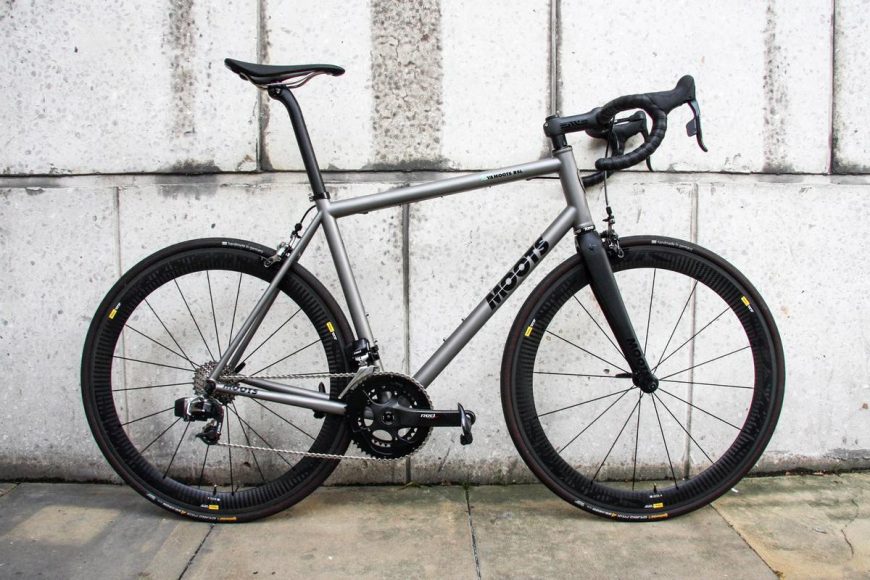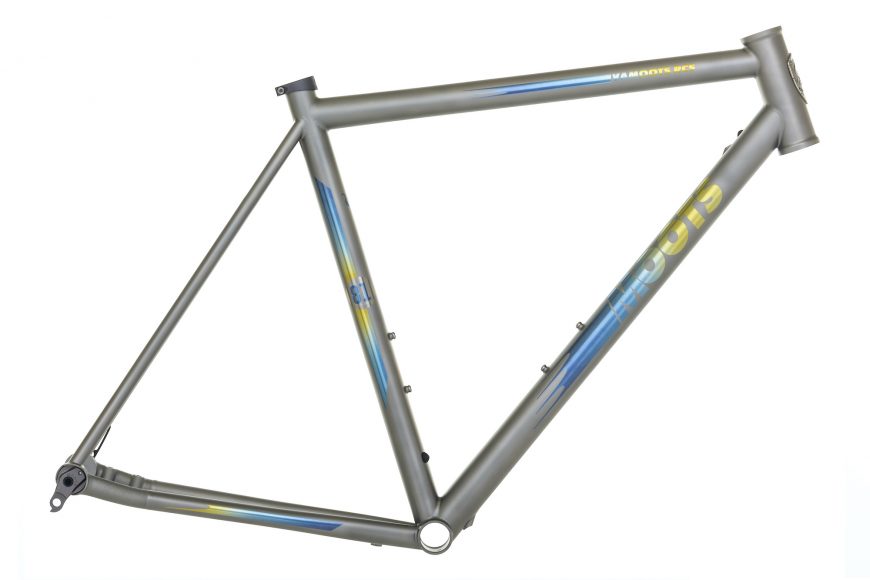Should you go with a titanium bike or a carbon fiber bike? Well, that’s a good one! Both of them have their pros and cons and the right answer to this question depends on your choice. When we talk about titanium or a carbon fiber bike, we are referring to the frame of the bike.
Now, I think the frame is the most important part of a bicycle. Think of it as a skeleton that holds your bicycle together. Now the skeleton has to be strong so it can keep your bike running, Don’t you think? That’s why, in this guide, I will discuss both bike frames in detail. This way you can make a knowledge-backed decision!
Read? Let’s begin!
Titanium Vs Carbon Fiber Bikes: In-Depth Frame Analysis
There are a lot of differences between their frames. You can use either a titanium bike frame or carbon fiber frames to build responsive, durable, and high-performance bikes. Let’s take an in-depth look at each of these frames.
1. What Is The Frame Weight?
Titanium and carbon fiber are both lightweight materials but carbon fiber is the lightest. You won’t find a lighter material than carbon fiber which is used in the production of bicycles. What’s the benefit of a lightweight bike you ask? A carbon fiber bike allows you to ride faster, maneuver like a pro, and climb without a sweat.
For example, an average carbon fiber frame weighs 680 grams less than a titanium bike frame. If we compare a higher-end model then that will be 450 grams less than a titanium frame.
The total weight of a carbon fiber bike on an average scale is 6.8 kg (15 lbs). This is the minimum weight of a bike that is permitted by UCI Rules (Union Cycliste Internationale). Although the frames weigh around 700-1100 grams.
The titanium bike frames weigh around 1475-1700 grams (3.25-3.75 lbs). If you go for the lightest of the bunch, that will weigh around 1150 grams. Suppose you are going for a mountain bike and a road bike, the weight difference will be greater in a mountain bike, just because it has more materials. Now that you have a rough idea about the frame weight of these two materials, you must be wondering about the lightness of carbon fiber. Why is that so?
This is because it is less dense. Modern frames have a density of 1.9 grams per cm^3. Titanium frames, on the other hand, have a density of 4.5 grams per cm^3. The difference in density between these two materials is almost half!
A low-quality carbon frame will contain more resin and filers, this increases the overall weight of the frame. A higher-quality frame on the other hand will be the lightest you have ever seen. Yes, a lower-quality carbon fiber frame could have the same weight as a titanium frame.
2. There Is A Difference In Comfort
Comfort is a really big factor when deciding on a bike’s frame. Titanium is more comfortable. Titanium does a really good job of absorbing shocks from the road.
Riding on rough terrain can be full of adventure but you can also face severe issues. Whenever you hit a bump on the road while traveling on a titanium bike, the bike’s frame will slightly deform to absorb a significant part of that energy. This way, your ride becomes comfortable.
When you hit the same bump on the road with a rigid carbon fiber bike frame, the energy is transmitted through the frame and into your body. This will make the ride feel bumpy.
If you prefer long-distance riding like bike packing, touring, or gravel riding, then I suggest going for titanium bikes.
3. What About Durability?
Titanium is way more durable than carbon fiber. Since titanium is a much less brittle material, its durability is enhanced automatically. In the case of an intense impact, there are few chances that titanium will crack open or get a dent. A carbon fiber bike can be harmed though.
Titanium frames are resistant to corrosion and they don’t fatigue. If your bike is equipped with a high-end titanium frame, it will withstand a lot of punishment. Carbon fiber is a brittle material, it isn’t that much durable in the long run.
On the other hand, carbon fiber now. In the case of an intense collision, the carbon fiber frame won’t be able to withstand the impact. Apart from this, you will be surprised to know that it also has a great strength-to-weight ratio, just like titanium. It also doesn’t fatigue and corrode, sharing similar properties with aluminum.
4. The Frame Fitting
Titanium frames are better than carbon fiber when it comes to frame fitting. They offer a better fitting because the tubes can always be fine-tuned. Another thing about this material is that manufacturers offer custom-made titanium bikes, according to the rider’s height, weight, and other dimensions. Carbon fiber bikes are available in pre-made sizes, but the range of options for the customer is very limited. They are sold off the shelf.
Related: Bike Size Chart
Titanium Vs Carbon Fiber: Differentiating Ride Characteristics
Let’s discuss the different ride characteristics of both these frame materials now.
1. Titanium Bikes Have A Better Ride Quality
Users who have tried out titanium bikes have said that it offers exceptional ride characteristics. There is a balance between compliance and stiffness. Another reason why titanium is preferred is because of the customization options it offers.
Let’s talk about carbon fiber now. It also offers amazing ride quality and is the lightest of all the bike materials. The handling that these bikes offer is very predictable and responsive. Since it has a low density, it offers exceptional vibration absorption qualities.
Ride quality is always going to be subjective. Some might love carbon fiber while some might want to go with a titanium frame. The thing is, both of these materials are used to make premium and high-quality bikes.
Check out our guide on how to choose the right combination of frame and wheels to build your super-light road bike.
2. Titanium Frames Have A Better Longevity
Let’s talk about titanium bike frames first, they can last forever if you take proper care of them. Titanium is a durable material. Since this material is less brittle, it can survive a harder impact as compared to carbon fiber.
It also doesn’t fatigue because it has a fatigue limit. Although this will vary from bike to bike. Apart from this, titanium is also resistant to corrosion and degradation, which enhances its durability.
One of the best things about carbon fiber is that it doesn’t corrode because it isn’t a metal. It doesn’t have a fatigue limit just like titanium, but it does fatigue slowly over time. Carbon fiber is a strong material. If taken care of properly, carbon fiber lasts around 6-10 years. While titanium can last around much more than that.
3. Both Frames Are Costly
Both carbon fiber and titanium are high-quality and premium frames. If you are budget-conscious then you should look for other options. The cost of these frames is going to vary from one manufacturer to the other. It will also depend on the quality of the frame. Including if you want to get the frame custom-made or not.
For a high-end carbon fiber or titanium frame, you might have to spend around $2500-$7000. The figures can be higher. In the case of a lower-end titanium or carbon frame, you should have a budget of $2000 but it can increase.
Cycling is the most sustainable mode of urban transportation. Read our guide to learn the environmental benefits of cycling.
4. They Have Different Aesthetics
Carbon fiber and titanium frames have different aesthetics. What you will like depends on your preferences. I think titanium frames look more attractive. Most of these frames feature round tubes, which is pretty neat! They are not covered up with flashy colors or decals.
Carbon fiber frames are attractive too but they are manufactured with aerodynamic properties in mind. You will notice that the tubes are often curved. Yes, they help a lot with performance but they look plain horrid. So if you want to go with a more attractive option, you should consider titanium!
5. Titanium Is More User-Friendly
Titanium is the kind of material that can easily be recycled. So if you are looking for an environmentally-friendly material, titanium should be your priority. Since it doesn’t corrode or degrade, these frames/bikes last for a lifetime. Even if your titanium bike frame wears out at some point, you can easily recycle it and make other products.
Carbon fiber cannot be recycled. Since they are not a metal, they also cannot be melted down and turned into other products once they wear out.
Check out our comprehensive guide on electric bikes vs cars. Learn about the benefits of electric bikes and how they can help you reduce your carbon footprint
6. Titanium Offers More Rider Safety
Carbon fiber frames are dangerous because, with a sudden impact, they can crack open very easily. These cracks are sometimes very hard to notice when repairing. Apart from this, sometimes poor or average-quality materials or silly mistakes during production can make a carbon fiber bike unfit for usage.
According to reports, the carbon fiber frame can fail without warning. So if you are speeding down a hill at 30 or 40 mph and the bike tube splits in half then you could end up having an accident.
Titanium frames on the other hand are very durable and strong. Before failing they give a lot of warning signs. You will start seeing cracks before the frame gets damaged or worse. Since these frames aren’t painted, you can easily notice the cracks. Overall, titanium bikes ensure proper rider safety!
Comparison Table Of Titanium Bikes and Carbon Fiber Bikes
| Feature | Titanium Bikes | Carbon Fiber Bikes |
|---|---|---|
| Durability | Extremely durable, strongest metal, resistant to corrosion | Lightweight but weaker compared to titanium |
| Weight | Lightweight, easy to maneuver | Lightest material enhances speed and maneuverability |
| Comfort | Excellent shock absorption, comfortable on tough terrain | Stiff, may be less forgiving on rough or bumpy terrain |
| Customization | Highly customizable due to the malleability of titanium | Offers a lot of customization options for unique designs |
| Aesthetics | Sleek and distinct appearance | Stylish appearance with unique shock absorption features |
| Long-Term Cost | Cheaper in the long run due to high durability | Expensive upfront cost, repairs are easier and cheaper |
| Manufacturing Difficulty | Complex manufacturing process, skilled labor required | Easier to manufacture, more options for design |
| Repair Difficulty | Parts may be difficult to find or expensive to repair | Easier repairs with widely available materials |
| Noise/Vibration Reduction | Absorbs shocks and vibrations well | Reduces noise and vibrations for a smoother ride |
| Environmental Impact | Titanium is abundant but manufacturing can still have an impact | Energy-intensive manufacturing process, environmental concerns |
| Mounts for Luggage | Usually accommodates mounts for racks and panniers | Often lacks mounts, making it challenging to carry luggage |
| Overall Comfort | Comfortable for long rides, especially on tough terrain | May not be as comfortable on rough terrain or long rides |

So Which Frame Should You Choose?
That’s a choice you have to make for yourself. But here is what you can consider based on different kinds of uses:
| Consideration | Titanium Bikes | Carbon Fiber Bikes |
|---|---|---|
| High-End, Lifetime Investment | If you are looking for a high-end bike that will last for a lifetime. | |
| Rugged Terrain and Risky Maneuvers | If you plan on riding on rugged terrain or performing risky maneuvers. | |
| Multi-Purpose Use | If planning to use your bike for multiple purposes. | |
| Competitive Riding | If you are a competitive rider or prioritize weight and efficiency. | |
| Professional Rider | All professional riders are using carbon fiber bikes these days. | |
| Weight and Efficiency | If you obsess over weight and efficiency, carbon fiber is a suitable choice. |
What About Other Bike Frame Materials?
Carbon fiber and titanium are high-end bike frame materials that you can go for, but you can also choose aluminum and steel if you are low on budget. Watch this fun yet helpful video to help you choose other bike frame materials!
My Advice On Choosing A Bike Frame
We have some helpful tips for you that can make this complex decision much easier. Whenever you go looking for a bike frame, consider these helpful tips.
- Choose The Right Frame Size: The right frame size is very critical, you need to go with a bike frame that fits you properly. With the right-sized bike, your cycling performance will increase and so will your confidence.
- Frame Geometry: Being a rider, you should know that a bike’s geometry can affect the ride characteristics of that bike, this includes handling, comfort, and steering. Titanium, carbon fiber, and other frame materials are available in different geometries.
- Wheel Size: Some frames are compatible with only one wheel size because the wheel size affects the bottom bracket height. Tire clearance and brake compatibility are also something that you should consider.
- Different Brake Types: Not all bike frames will allow you to install rim brakes or disc brakes, you will have to be very careful with that.
- Cost: Carbon fiber and titanium are high-end and very expensive frames and unless you have the budget to afford them, you should steer clear.
- Till When Do You Plan To Keep Your Bike: If you are planning on using your bike for a very long time, you should invest in high-end frame materials, otherwise, just go with aluminum.
Proper road bike sizing and fitting are essential for a comfortable and efficient ride. Read our guide to learn why you need to worry about road bike sizing and fitting.
FAQs
What is better titanium or carbon fiber?
The answer to this question is subjective, but titanium is way more comfortable and durable than carbon fiber.
Do titanium bikes rust?
Pure Titanium is rust-resistant, other titanium frames also don’t corrode or degrade.
How long can titanium last?
Titanium can last for a lifetime if taken care of properly.
The Verdict
After evaluating both frames and spending considerable time researching the pros and cons of both types, I’d give Titanium frames 8.5 and Carbon frames 7.5 out of 10. This is because carbon frames are a bit fragile and I am an aggressive rider. So, I am constantly worried that I might damage my frame while riding.
Nonetheless, both are great options to go with. Here’s the deal: The choice of what material you prefer depends on the type of riding you do, how long you plan on using your bike, and other preferences.
If you want the lightest material and want to ride competitively then go for carbon fiber. On the other hand, if you want a bike that will last for a lifetime and can be custom-made according to your body dimensions then go with titanium. No matter what choice you make here, you will not be disappointed!
Also Read:
- 15 Best Carbon Road Bikes – Under $2000
- Giant Vs. Trek Bikes: Which Is The Best Option?
- The 13 Different Types Of Bikes You Need To Know About
Should you have any questions or require further clarification on the topic, please feel free to connect with our expert author Luke Ameen by leaving a comment below. We value your engagement and are here to assist you.










